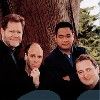Alexander String Quartet opens Williamstown Chamber Concerts
By: Michael Miller - Aug 11, 2006
Williamstown Chamber Concerts, Clark Art Institute, August 1, 2006Alexander String Quartet (Zakarias Grafilo, Frederick Lifsitz, violins, Paul Yarbrough, viola, Sandy wilson, cello)
Mozart, String Quartet no. 15 in d minor, K. 421, Ravel, String Quartet in F Major (11902-03), Shostakovich, String Quartet in F Major, Op. 73 (1946).
I always look forward each August to the Williamstown Chamber Concerts with their diversity of performers and repertoire. Usually established groups are combined with at least one newcomer. This year the series began with the Alexander Quartet, who celebrate their 25th anniversary this year. Based in San Francisco, they have been ensemble-in-residence at Baruch College in New York for twenty years and have traveled widely in Europe and America, playing a wide variety of the classical repertoire and new music, including numerous works commissioned specifically for them. Their sound has an attractive dusky quality, and each player retains an individuality which gives their texture special clarity.
The Alexander Quartet began the Mozart d minor with a broad lyricism which was soon transformed into a briskly accented allegro. Their austere, dark tonality suited the music perfectly, relieved by Mr. Grafilo's eloquent phrasing. The Ravel String Quartet was also a brilliant success, thanks to the player's clearly differentiated voices, articulation, and attention to rests. The pizzicato section of the second movement was not only technically dazzling, it revealed inner textures in the music we don't always hear in performance.
Their project for the Shostakovich year was to learn, perform, and record all fifteen of his string quartets. Previously they had only included on or two in their repertoire. At this concert they chose the third, which he composed just after the end of the Second World War. Of its five movements the earlier conform to Soviet aesthetic prescriptions, as if Shostakovich were dutifully trying to make the elitist genre of the string quartet more accessible to a broad public, while the last two take a darker, more personal turn. The Alexander Quartet's overall sound is reminiscent of the Soviet players who dominated this repertoire a generation ago, but darker, a quality that suits the music well. In the first movement their humor perhaps lacked some of the bite we know from performances like the Borodin Quartet's, but their geniality was equally successful, providing an effective prelude to the troubled moods of the Adagio and Moderato. Particularly compelling was the dialogue between cello and viola which concludes the fourth movement and begins the fifth.
They concluded the concert with an encore, Mozart's very first string quartet, K. 80, a tender work, which both musicians and audience seemed to relish after Shostakovich's grim lament.
I include here a link to the Alexander Quartet's Web site. This includes a discography, which some may find useful, since some of their recordings may be difficult to find.
http://www.asq4.com/
The work of this excellent ensemble is certainly worth exploring further.

